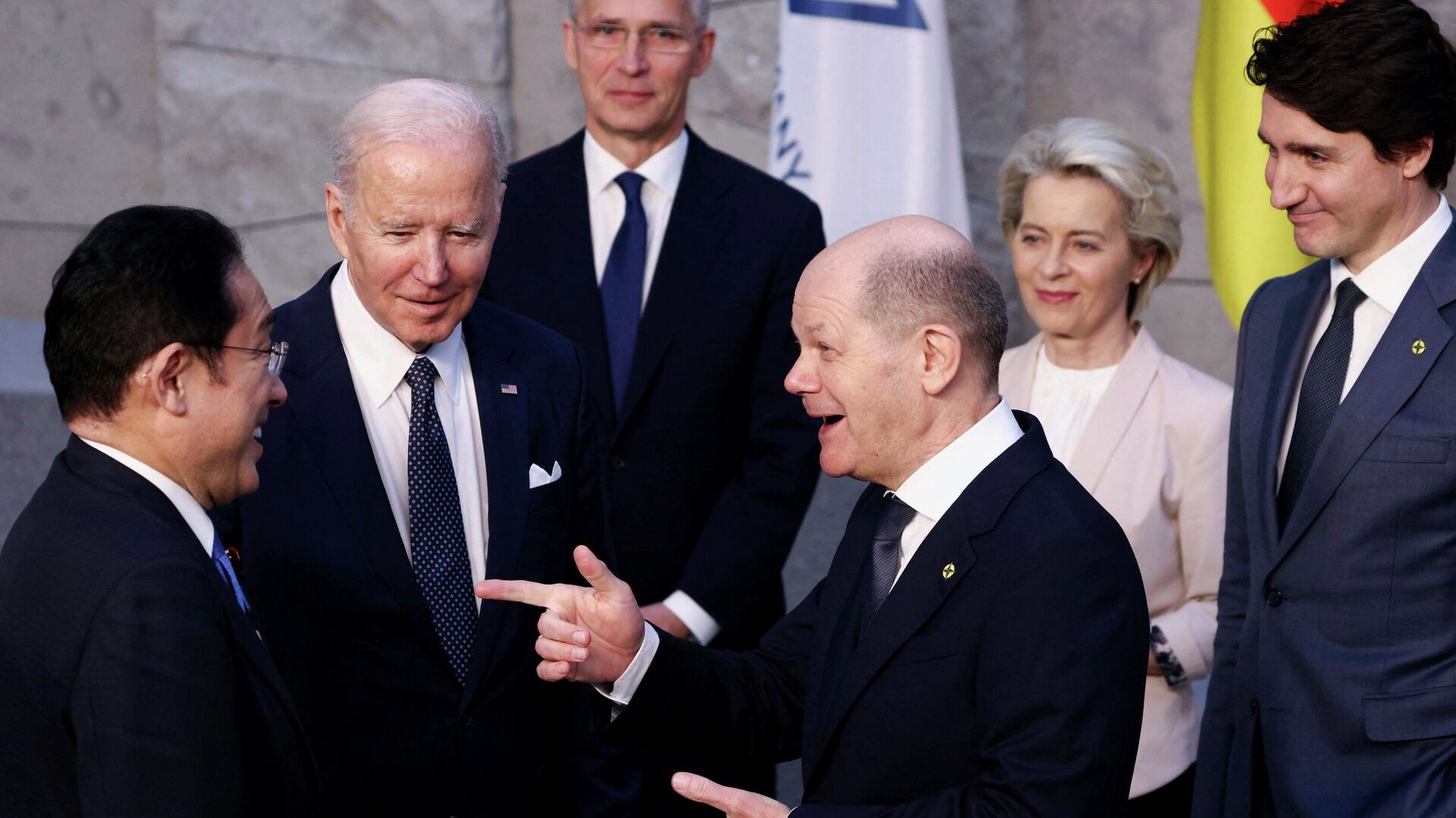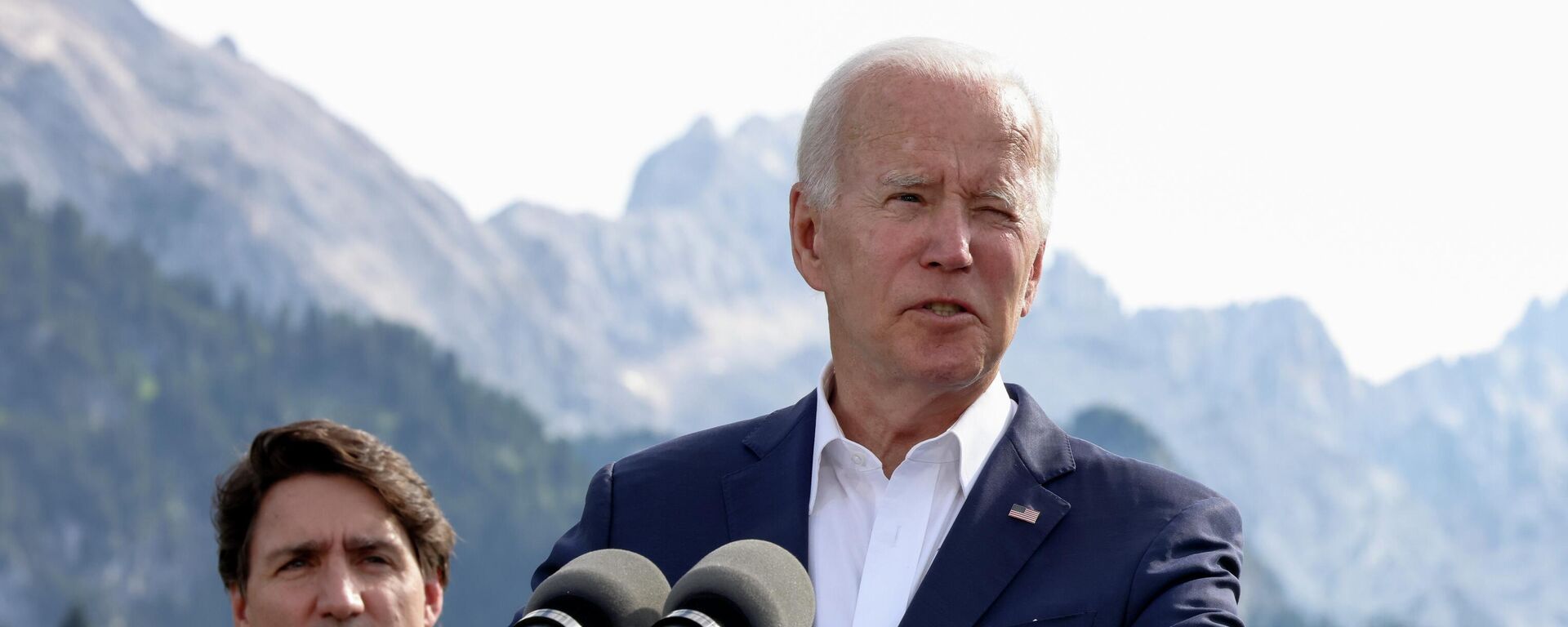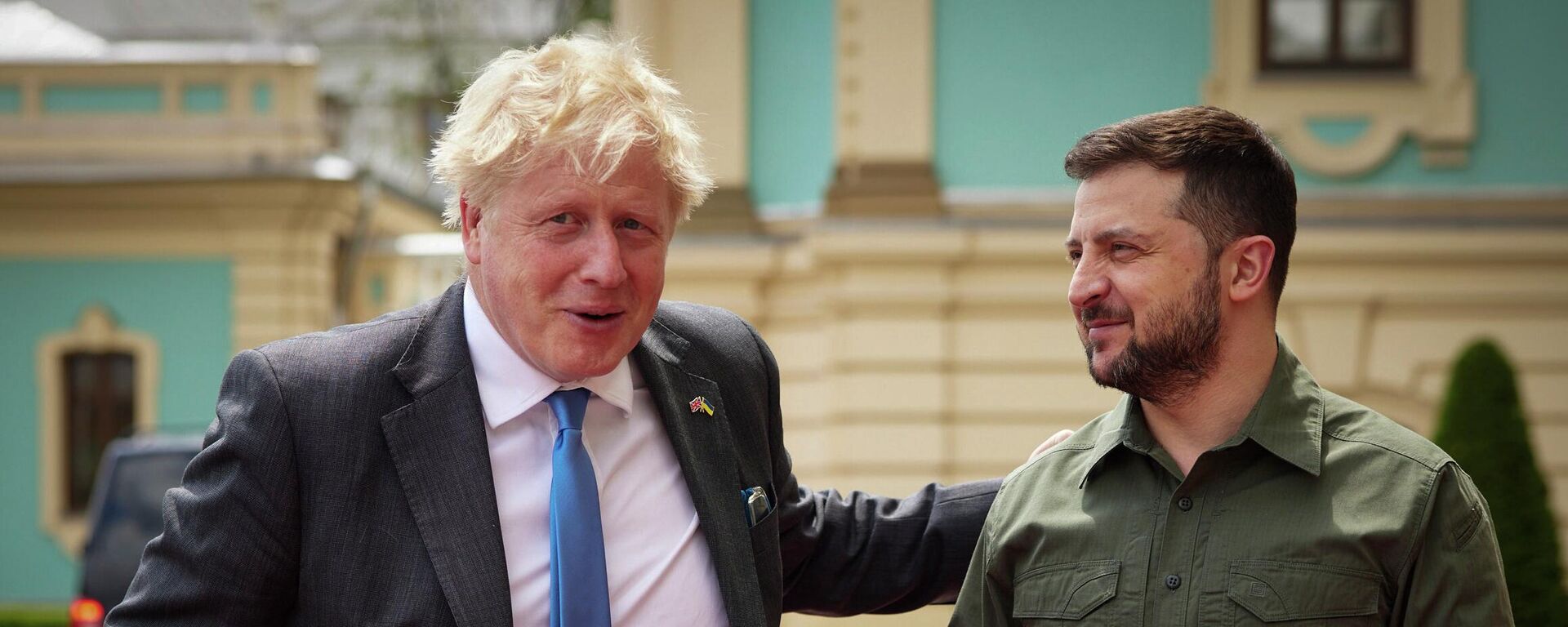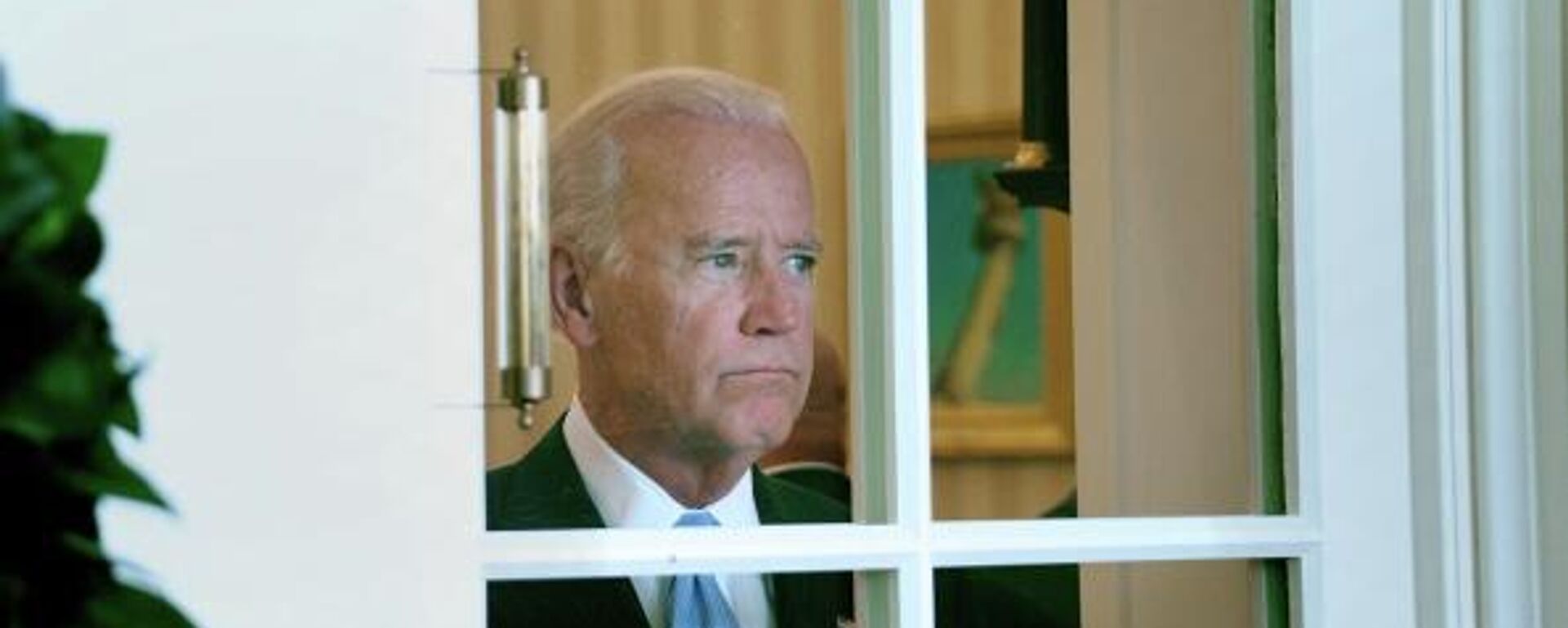https://sputnikglobe.com/20220626/g7s-unity-check-western-nations-split-over-russia-sanctions-economic-crisis-say-scholars-1096679909.html
G7's Unity Check: Western Nations Split Over Russia Sanctions, Economic Crisis, Say Scholars
G7's Unity Check: Western Nations Split Over Russia Sanctions, Economic Crisis, Say Scholars
Sputnik International
On 26 June, US President Joe Biden arrived in the Bavarian Alps to take part in the G7 summit with his key allies and discuss new sanctions against Russia amid... 26.06.2022, Sputnik International
2022-06-26T16:51+0000
2022-06-26T16:51+0000
2022-11-15T14:20+0000
us
europe
g7
russia
ukraine
sanctions
special operation
recession
inflation
gas
https://cdn1.img.sputnikglobe.com/img/07e6/04/13/1094877920_0:165:3055:1883_1920x0_80_0_0_a5f1fb8966d9ffc209aab92952035898.jpg
"Looking at the seven countries comprising the G7 we find out that five of the seven countries are fractured at home," says Paolo Raffone, a strategic analyst and director of the CIPI Foundation in Brussels. "The US is dangerously split over domestic affairs, living a low-key civil war ahead of mid-term and presidential elections that will occupy the stage until 2024… Germany reunified in 1990 but is dramatically split between West and East and South. Recent polls show that there are at least three Germanies with divergent perceptions and needs in energy, economics, democracy, rule of law, and with respect to Russia and the war in Ukraine… The UK is far less united than it pretends, as Brexit has shown... France is split in half between the Macronists and the opposition. Macron has failed so far in delivering both domestic benefits and international relevance. The EU is as irrelevant as its leaders."The G7 is considering stepping up sanctions against Russia. In particular, the gathering is discussing a new international export ban on Russian gold as well as the idea of a cap on Russian oil prices which would set an upper limit on imports of crude from the country and prevent Moscow selling at a higher price. Backers of the latter measure claim that it could potentially control rampant inflation driven by energy prices. For its part, Italy is calling to go further and introduce a cap on Russia's gas prices too. There are fears, however, that Moscow could simply cut gas supplies in response, according to the Guardian.According to Wimmer, the major obstacles to G7 unity are what's happening on the ground in the Donbass zone of conflict where DPR and LPR forces are making steady gains, and economic hurdles Europe is facing this winter. In addition to that, discontent is brewing among Europeans as EU governments refuse to exploit chances for peace despite Pope Francis calling for a diplomatic settlement of the crisis.The US and its NATO allies have imposed "unprecedented" sanctions on Moscow since the beginning of the Russian special military operation in Ukraine on 24 February. However, after the introduction of anti-Russian restrictions, oil and food prices have shot up globally, putting a rocket under inflation in major western economies, something Bloomberg has recently called "self-sanctioning". Moves by the US, the UK and the EU's central banks to increase borrowing costs gradually in an attempt to tame inflation are paving the way for recession, economists warn.G7 Price Cap Plan is Unlikely to FlyObservers also expressed skepticism about the G7's latest "price cap" initiative meant to limit Russian oil and gas profits.There is a clear logic behind crude producers' unwillingness to sell their commodity at low prices, Hoffmann added: "The pitfall is in the fact that the capacities of oil in the world are limited and you do damage to your own country when you give it away too cheaply," he explains.In addition to that, the idea to put price caps on energy - proposed and supported by Italy's prime minister Mario Draghi, has not been accepted by the EU Council so far, according to Raffone. He notes that the EC has instructed the Commission to present a “study” of the subject by next September. When it comes to individual European states, they don't appear much interested in introducing the measure, the Italian analyst notes. However, the implementation of the policy would require the agreement of all 27 EU member states."France has not been very interested (they have nuclear power), Germany is not so interested because its internal pipelines in its western regions can be filled by sea diversified imports (East Germany is totally dependent on the Russia imports)," he says. "Holland has been opposing it because it controls the energy commodity market and would lose money with a price cap. Spain is also connected by its internal pipelines to sea imports. Behind the scenes, the US is interested in selling its energy at a high price to European allies."Furthermore, it remains unclear how key buyers of Russian crude such as China and India could be forced to comply with the western "price cap" strategy, the Guardian acknowledges.'UK's Dangerous Game to Support Ukraine Until Victory'The EU is at present deeply split along national, geographic and social lines being a "Faustian grouping without a head, a vision, or a realistic common interest," Raffone says. Thus, the UK and US have managed to force the European bloc into adopting "a nonsensical and unsustainable approach to the crisis with Russia in Ukraine," he notes.The UK has doubled down on the necessity to tighten the screws further on Moscow on the eve of the summit. British Prime Minister Boris Johnson warned the participants about the likelihood of "fatigue" among western nations over continued support for Ukraine.Previously, the UK premier came up with a new plan aimed to increase the military aid to Kiev and to keep the conflict dragging on. Before the G7 summit, the Daily Telegraph reported that Johnson is expected to push Paris and Berlin to increase their support for Ukraine, "as he fears that [Ukrainian President] Volodymyr Zelensky could be bounced into agreeing a 's***y' peace deal [with Russia]".Taking on Russia and China at Once Proves Counter-ProductiveThe G7 meeting is also expected to focus on Joe Biden's endeavor named "Build Back Better World" (B3W) - a formal global infrastructure partnership to overcome China's influence in the developing world.Biden first launched the plan a year ago. The initiative envisaged helping "narrow the $40 trillion+ infrastructure need" in developing countries "from Latin America and the Caribbean to Africa to the Indo-Pacific". According to the plan, the G7 and other like-minded partners would mobilize "private-sector capital in four areas of focus," namely climate, health, and health security, digital technology, and gender equity and equality. The Chinese daily Global Times immediately blasted Biden's B3W endeavor as an attempt to disrupt China's Belt and Road Initiative, arguing that B3W is no match to the Beijing-led project. Meanwhile, Biden's bold plan has yet to fly.The West's attempts to contain Russia and China simultaneously have not borne fruit so far. Recently, the Biden administration announced that it would lift some of China's tariffs imposed by President Donald Trump. Even though Washington has not given up its Taiwan and South China Sea strategy aimed at encircling China, international observers see the Biden administration's recent moves as a sign of weakness and waning influence ahead of a potential defeat of the Democratic Party in the November mid-terms.
https://sputnikglobe.com/20220626/g7-launching-global-infrastructure-and-investment-partnership-to-boost-global-economy-supply-chains-1096678342.html
https://sputnikglobe.com/20220620/whats-behind-johnsons-new-plan-to-keep-the-ukraine-crisis-dragging-on-1096471040.html
https://sputnikglobe.com/20220624/scholar-bidens-plan-to-lift-china-tariffs-shows-us-cant-take-on-beijing-and-moscow-at-once-1096638293.html
ukraine
Sputnik International
feedback@sputniknews.com
+74956456601
MIA „Rossiya Segodnya“
2022
News
en_EN
Sputnik International
feedback@sputniknews.com
+74956456601
MIA „Rossiya Segodnya“
Sputnik International
feedback@sputniknews.com
+74956456601
MIA „Rossiya Segodnya“
us, europe, g7, ukraine, sanctions, special operation, recession, inflation, gas, oil
us, europe, g7, ukraine, sanctions, special operation, recession, inflation, gas, oil
G7's Unity Check: Western Nations Split Over Russia Sanctions, Economic Crisis, Say Scholars
16:51 GMT 26.06.2022 (Updated: 14:20 GMT 15.11.2022) On 26 June, US President Joe Biden arrived in the Bavarian Alps to take part in the G7 summit with his key allies and discuss new sanctions against Russia amid rocketing inflation and fear over the looming recession. How united is the anti-Russia front and what obstacles is it facing?
"Looking at the seven countries comprising the G7 we find out that five of the seven countries are fractured at home," says Paolo Raffone, a strategic analyst and director of the CIPI Foundation in Brussels. "The US is dangerously split over domestic affairs, living a low-key civil war ahead of mid-term and presidential elections that will occupy the stage until 2024… Germany reunified in 1990 but is dramatically split between West and East and South. Recent polls show that there are at least three Germanies with divergent perceptions and needs in energy, economics, democracy, rule of law, and with respect to Russia and the war in Ukraine… The UK is far less united than it pretends, as Brexit has shown... France is split in half between the Macronists and the opposition. Macron has failed so far in delivering both domestic benefits and international relevance. The EU is as irrelevant as its leaders."
The G7 is considering stepping up sanctions against Russia. In particular, the gathering is discussing a new international export ban on Russian gold as well as the idea of a cap on Russian oil prices which would set an upper limit on imports of crude from the country and prevent Moscow selling at a higher price. Backers of the latter measure claim that it could potentially control rampant inflation driven by energy prices. For its part, Italy is calling to go further and introduce a cap on Russia's gas prices too. There are fears, however, that Moscow could simply cut gas supplies in response, according to the Guardian.
"The West commits economic suicide and global disaster, because it refuses to discuss urgent security issues with Moscow," says Willy Wimmer, former vice-president of the Organization for Security and Cooperation in Europe, and an ex-Bundestag MP. "The situation for all of us is too serious to have the slightest understanding of the barrage of western sanctions, because they make decisions and Moscow gets success. There is a sense of a desperate situation."
According to Wimmer, the major obstacles to G7 unity are what's happening on the ground in the Donbass zone of conflict where DPR and LPR forces are making steady gains, and economic hurdles Europe is facing this winter. In addition to that, discontent is brewing among Europeans as EU governments refuse to exploit chances for peace despite Pope Francis calling for a diplomatic settlement of the crisis.
The US and its NATO allies have imposed "unprecedented" sanctions on Moscow since the beginning of the Russian special military operation in Ukraine on 24 February. However, after the introduction of anti-Russian restrictions, oil and food prices have shot up globally, putting a rocket under inflation in major western economies,
something Bloomberg has recently called "self-sanctioning". Moves by the US, the UK and the EU's central banks to increase borrowing costs gradually in an attempt to tame inflation are paving the way for recession, economists warn.
G7 Price Cap Plan is Unlikely to Fly
Observers also expressed skepticism about the G7's latest "price cap" initiative meant to limit Russian oil and gas profits.
"Direct price caps are always nonsense, especially in the oil market," says Florian Josef Hoffmann, former President of the Chamber of Industry and Commerce East Thuringia and author of Occupy Economics. "It’s simply too big and not centralized enough. There are 52 oil-producing countries worldwide producing different qualities of oil. A third of these are members of OPEC, which is more or less successfully steering capacities and thus holding prices roughly stable - in normal times. So, when somebody wants to impose price caps, he has to increase the quantities mined and offered as soon as the oil price climbs too high. That means many producer countries have to give away some of their oil to keep the price down. I see no way such an action could happen, as there are not enough countries worldwide that joined the sanctions."
There is a clear logic behind crude producers' unwillingness to sell their commodity at low prices, Hoffmann added: "The pitfall is in the fact that the capacities of oil in the world are limited and you do damage to your own country when you give it away too cheaply," he explains.
In addition to that, the idea to put price caps on energy - proposed and supported by Italy's prime minister Mario Draghi, has not been accepted by the EU Council so far, according to Raffone. He notes that the EC has instructed the Commission to present a “study” of the subject by next September. When it comes to individual European states, they don't appear much interested in introducing the measure, the Italian analyst notes. However, the implementation of the policy would require the agreement of all 27 EU member states.
"France has not been very interested (they have nuclear power), Germany is not so interested because its internal pipelines in its western regions can be filled by sea diversified imports (East Germany is totally dependent on the Russia imports)," he says. "Holland has been opposing it because it controls the energy commodity market and would lose money with a price cap. Spain is also connected by its internal pipelines to sea imports. Behind the scenes, the US is interested in selling its energy at a high price to European allies."
Furthermore, it remains unclear how key buyers of Russian crude such as China and India could be forced to comply with the western "price cap" strategy, the Guardian acknowledges.
'UK's Dangerous Game to Support Ukraine Until Victory'
The EU is at present deeply split along national, geographic and social lines being a "Faustian grouping without a head, a vision, or a realistic common interest," Raffone says. Thus, the UK and US have managed to force the European bloc into adopting "a nonsensical and unsustainable approach to the crisis with Russia in Ukraine," he notes.
The UK has doubled down on the necessity to tighten the screws further on Moscow on the eve of the summit. British Prime Minister Boris Johnson warned the participants about the likelihood of "fatigue" among western nations over continued support for Ukraine.
Previously, the UK premier came up with a new plan aimed to increase the military aid to Kiev and to keep the conflict dragging on. Before the G7 summit, the Daily Telegraph reported that Johnson is expected
to push Paris and Berlin to increase their support for Ukraine, "as he fears that [Ukrainian President] Volodymyr Zelensky could be bounced into agreeing a 's***y' peace deal [with Russia]".
"The UK’s deep state has taken a dangerous gamble to support Ukraine 'until victory' to capitalize on splits in the EU and paralysis in the US with the hope to succeed in delivering on the 'global Britain' promise," says Raffone. "UK citizens seem much less dumb than the government thinks: huge demonstrations and a series of paralyzing strikes as well as the constant vote refusing the Tories is the reality."
Taking on Russia and China at Once Proves Counter-Productive
The G7 meeting is also expected to focus on Joe Biden's endeavor named "Build Back Better World" (B3W) - a formal global infrastructure partnership to overcome China's influence in the developing world.
Biden first launched the plan a year ago. The initiative envisaged helping "narrow the $40 trillion+ infrastructure need" in developing countries "from Latin America and the Caribbean to Africa to the Indo-Pacific". According to the plan, the G7 and other like-minded partners would mobilize "private-sector capital in four areas of focus," namely climate, health, and health security, digital technology, and gender equity and equality. The Chinese daily Global Times immediately blasted
Biden's B3W endeavor as an attempt to disrupt China's Belt and Road Initiative, arguing that B3W is no match to the Beijing-led project. Meanwhile, Biden's bold plan has yet to fly.
"We have to face reality: G7 is 10 percent of the world population and 30 percent of the economic power, not less and not more," Wimmer says. "The question is whether the West, as long as it exists, improves these numbers because it has convincing models for all global challenges, or whether it wants to maintain its position by going to war."
The West's attempts to contain Russia and China simultaneously have not borne fruit so far. Recently, the Biden administration announced that it would lift some of China's tariffs imposed by President Donald Trump. Even though Washington has not given up its Taiwan and South China Sea strategy aimed at encircling China,
international observers see the Biden administration's recent moves as a sign of weakness and waning influence ahead of a potential defeat of the Democratic Party in the November mid-terms.





